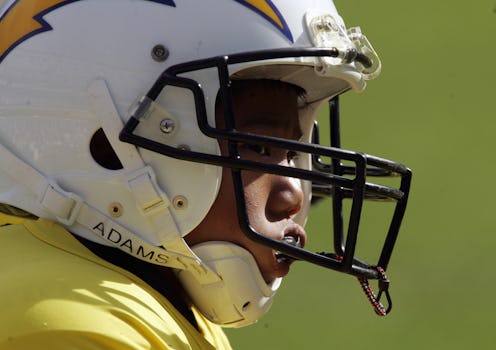News
Is Football Safe For Children? No, Not Really
This Super Bowl Sunday, tons of children will emulate their football-star heroes as they go outside to throw the ball around, spike a touchdown, and maybe even tackle one another to prevent a first down. It's a classic American sport and well-loved by millions, adults and children alike. But researchers at Boston University are cautioning that playing football is unsafe for children. I know, I know, it's something that's been said before. Opponents stress the dangers of the game, while football fanatics say it toughens kids up. But this isn't your typical complaint from a worried parent — the researchers conducted a study on 42 former NFL players and found that those who began playing the sport before the age of 12 suffered from significant cognitive impairment, including "executive dysfunction, memory impairment, and lower estimated verbal IQ."
In an editorial that accompanies the study, Christopher M. Filley, MD and Charles Bernick, MD, MPH, write that every child age 9 to 12 can be exposed to 240 head impacts during one season alone. Although it might seem obvious that's incredibly harmful for a growing brain and its mental capacity, the writers state that 70 percent of football players in the United States are under the age of 14, which means a large amount of children might be facing hardship later in life. Filley and Bernick write:
Whereas the benefits of physical exercise are undeniable for the promotion of cardiovascular health and psychological well-being, participation in football may result in neurologic sequelae ranging from mild traumatic brain injury (mTBI) to death, and repetitive mTBI has been associated with a degenerative dementia in later life known as chronic traumatic encephalopathy (CTE).
As the Seattle Seahawks prepare to take on the New England Patriots this weekend, I'll probably be thinking about how NFL players suffer from an average of 370 concussions in their lifetime — 392 if they started playing football before they turned 12. Although the study had a limited sample size and can't be held as gospel for holding kids back from playing the sport, researcher and neurology professor Robert Stern told The Washington Post:
This study supports the idea . . . that there may be later life consequences associated with childhood exposure to repetitive head impacts. Regardless of the results, it makes logical sense that children whose brains are rapidly developing should not be hitting their heads over and over again.
The researchers say that larger studies are needed to confirm the findings, and if they do, the authors urge people to begin considering safety changes in youth football. But youth football leaders say they have taken steps to protect children from harm, especially considering the recent conversation surrounding concussions and other injuries. Bob Colgate, director of sports and sports medicine for the National Federation of State High School Associations (NFHS), told Athletic Business last month:
We have more awareness on concussions, the equipment is better, our rules and risk-minimization are better than they've ever been to protect our athletes, our coaching techniques have changed, our officiating has improved.
Continuing to study the impact playing football has on children is critical, the researchers stated. And it is. I'm all for children having the opportunity to play the sport they're interested in, but their current safety as well as their long-term mental health needs to be seriously considered first. If former NFL players are having trouble with memory, problem-solving ability, and verbal intelligence, and it's much worse among those who started before the age of 12, we need to make sure we're doing everything we can to protect children from suffering the same fate.
Images: Getty Images (2)
